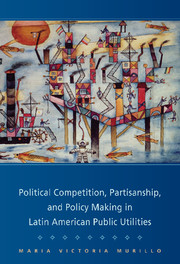Book contents
- Frontmatter
- Contents
- List of Acronyms
- Acknowledgments
- Introduction
- 1 Voice and Light
- 2 Political Competition and Policy Adoption
- 3 Casting a Partisan Light on Regulatory Choices
- 4 Postreform Regulatory Redistribution in Chile
- 5 Postreform Regulatory Redistribution in Argentina and Mexico
- 6 A Multilevel Analysis of Market Reforms in Latin American Public Utilities
- 7 Conclusion
- References
- Index
- Titles in the series
5 - Postreform Regulatory Redistribution in Argentina and Mexico
Published online by Cambridge University Press: 05 June 2012
- Frontmatter
- Contents
- List of Acronyms
- Acknowledgments
- Introduction
- 1 Voice and Light
- 2 Political Competition and Policy Adoption
- 3 Casting a Partisan Light on Regulatory Choices
- 4 Postreform Regulatory Redistribution in Chile
- 5 Postreform Regulatory Redistribution in Argentina and Mexico
- 6 A Multilevel Analysis of Market Reforms in Latin American Public Utilities
- 7 Conclusion
- References
- Index
- Titles in the series
Summary
This chapter focuses on regulatory redistribution in Argentina and Mexico, where populist converts had adopted market-oriented reforms with a market-controlling content, in contrast to the market-conforming Chilean reforms. In addition to assessing the effect of institutional legacies, the analysis of postreform policy making in these two countries provides longitudinal variation in the main political variables of interest. In both countries, reformers remained in power in the postreform period but were replaced by presidents of another political party. Thus, it is possible to assess the hypothesized effects of having adopted the reforms and the partisan preferences of incumbents. Like Chile, both countries experienced bouts of electoral competition around the turn of the century, and Argentina experienced an electricity crisis simultaneous to the Chilean one. Unlike Chile, however, these countries suffered deep macroeconomic crises in the postreform period. These conditions permit testing the effects of electoral competition and the impact of exogenous shocks on public salience. In contrast to Chile and Mexico, Argentina had well-organized consumer associations that had the ability to endogenously raise the public salience of telecommunications and electricity regulation issues. As in the Chapter 4, the cross-sectoral comparison within country serves to control for industry-specific factors.
Political Competition, Partisanship, and Institutional Legacies in Postreform Argentina
This section presents the expectations derived from the main hypotheses of Chapter 1 for regulatory preferences in postreform Argentina.
- Type
- Chapter
- Information
- Political Competition, Partisanship, and Policy Making in Latin American Public Utilities , pp. 178 - 225Publisher: Cambridge University PressPrint publication year: 2009

